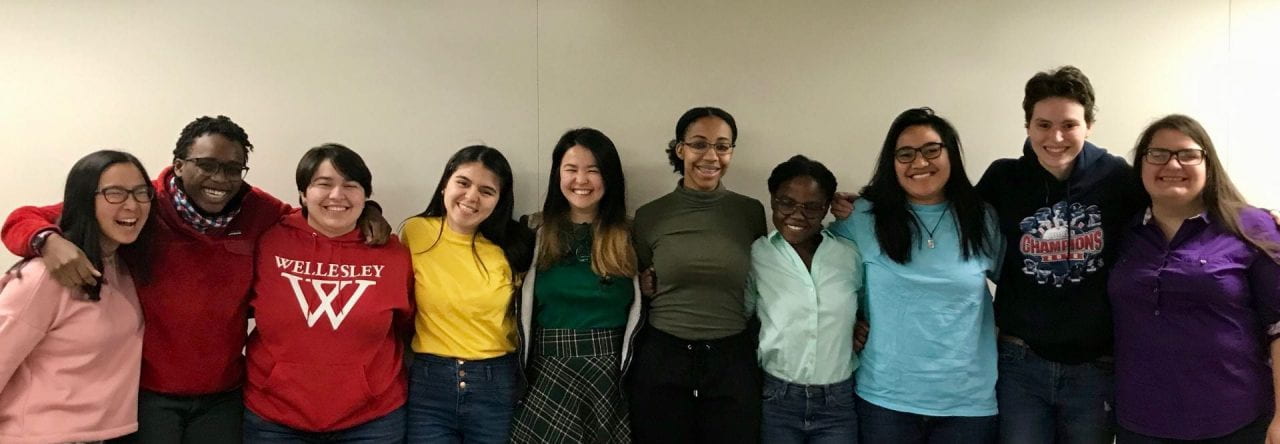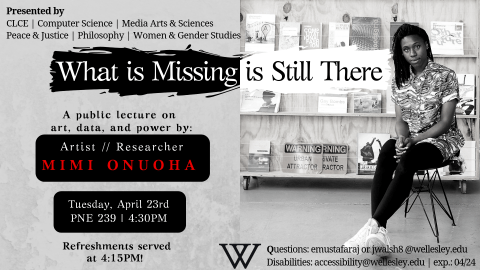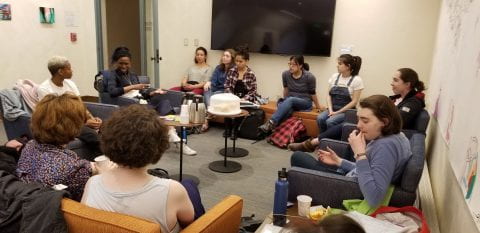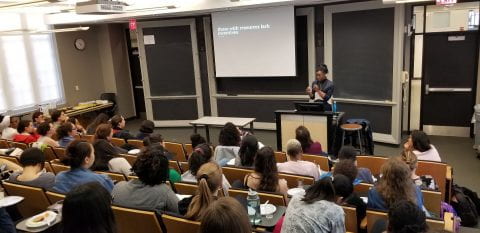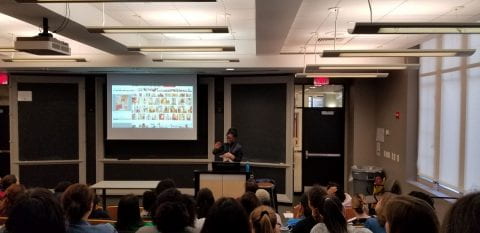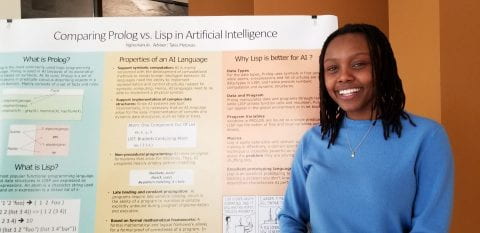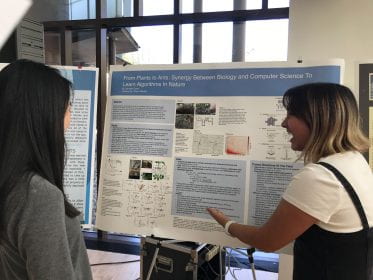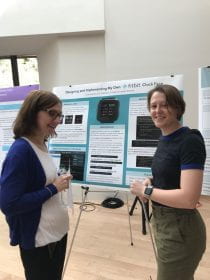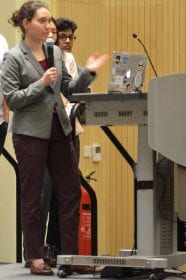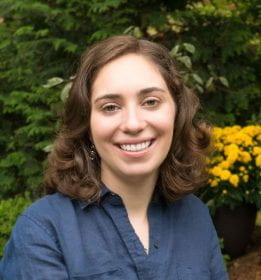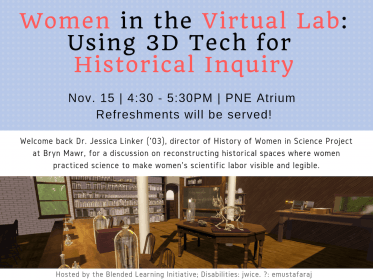With the start of the Fall 2018 semester, the Wellesley Computer Science Department is (belatedly) delighted to welcome and re-welcome 5 new and continuing faculty.
Our continuing colleague  Christine Bassem, Assistant Professor of Computer Science, initially joined Wellesley as a Lecturer in Computer Science after completing her PhD at Boston University in 2015. Her current research interest is on the design and analysis of incentive-compatible mechanisms for socially-aware networking, specifically in the domains of crowd sensing and opportunistic networks. She enjoys reading, doodling, and spending time with her family.
Christine Bassem, Assistant Professor of Computer Science, initially joined Wellesley as a Lecturer in Computer Science after completing her PhD at Boston University in 2015. Her current research interest is on the design and analysis of incentive-compatible mechanisms for socially-aware networking, specifically in the domains of crowd sensing and opportunistic networks. She enjoys reading, doodling, and spending time with her family.
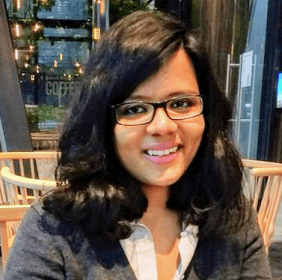 Shikha Singh, Assistant Professor of Computer Science, is a theoretical computer scientist who does research in the area of algorithmic game theory and algorithms for big data. As part of her dissertation research, she worked extensively on designing mechanisms for incentivizing correct behavior from service providers in internet marketplaces. Shikha is also interested in the area of online algorithms, secure data structures, combinatorial optimization and complexity theory. Her research work has been recognized by multiple fellowships such as the John Marburger III Fellowship for Science, Engineering, and Mathematics, Chateaubriand Fellowship and Renaissance Technology Fellowship. Shikha joins us from Stony Brook University where she completed her PhD. She is teaching CS235 this fall. Come say hi to Shikha in SCI E114.
Shikha Singh, Assistant Professor of Computer Science, is a theoretical computer scientist who does research in the area of algorithmic game theory and algorithms for big data. As part of her dissertation research, she worked extensively on designing mechanisms for incentivizing correct behavior from service providers in internet marketplaces. Shikha is also interested in the area of online algorithms, secure data structures, combinatorial optimization and complexity theory. Her research work has been recognized by multiple fellowships such as the John Marburger III Fellowship for Science, Engineering, and Mathematics, Chateaubriand Fellowship and Renaissance Technology Fellowship. Shikha joins us from Stony Brook University where she completed her PhD. She is teaching CS235 this fall. Come say hi to Shikha in SCI E114.
 Andrew Davis, Lecture in Computer Science, examines the relationships between computer science and music. Trained as a composer, Andrew’s research looks at how computer coding can be used to digitally create music. His background is in music where he earned a PhD in music composition from the University of Pennsylvania. Most recently he completed his graduate work in computer science from Stanford University. This semester, Andrew is excited to be teaching CS111!
Andrew Davis, Lecture in Computer Science, examines the relationships between computer science and music. Trained as a composer, Andrew’s research looks at how computer coding can be used to digitally create music. His background is in music where he earned a PhD in music composition from the University of Pennsylvania. Most recently he completed his graduate work in computer science from Stanford University. This semester, Andrew is excited to be teaching CS111!
 Peter Mawhorter, Instructor in the Computer Science Laboratory, does research on generative AI, with a special focus on computational narrative and implicit generative algorithms. His work overlaps with psychology, cognitive science, and literature, and part of his dissertation developed a theory of choice poetics. He comes to Wellesley from MIT, where he did a postdoc studying virtual identity systems, and before that from Pomona College, where he was a visiting professor for a year, and from UC Santa Cruz, where he got his PhD. Peter is teaching labs for CS 111 and CS 115 in both the Fall and Spring semesters this year, and you can stop by his office to say hi at SCI E128.
Peter Mawhorter, Instructor in the Computer Science Laboratory, does research on generative AI, with a special focus on computational narrative and implicit generative algorithms. His work overlaps with psychology, cognitive science, and literature, and part of his dissertation developed a theory of choice poetics. He comes to Wellesley from MIT, where he did a postdoc studying virtual identity systems, and before that from Pomona College, where he was a visiting professor for a year, and from UC Santa Cruz, where he got his PhD. Peter is teaching labs for CS 111 and CS 115 in both the Fall and Spring semesters this year, and you can stop by his office to say hi at SCI E128.
 Sam McCauley joins us during the Fall 2018 semester as a Postdoctoral Fellow. He completed his PhD at Stony Brook University, and attended Tufts University as an undergraduate. Sam is interested in algorithms and data structures, particularly in problems that come up when querying large databases. He focuses largely on external-memory algorithms, data structures for similarity search, and scheduling algorithms. Part of what he finds exciting about these areas is that structural insights from theory can lead to significant speedup in practice. Sam is teaching CS 115 this fall.
Sam McCauley joins us during the Fall 2018 semester as a Postdoctoral Fellow. He completed his PhD at Stony Brook University, and attended Tufts University as an undergraduate. Sam is interested in algorithms and data structures, particularly in problems that come up when querying large databases. He focuses largely on external-memory algorithms, data structures for similarity search, and scheduling algorithms. Part of what he finds exciting about these areas is that structural insights from theory can lead to significant speedup in practice. Sam is teaching CS 115 this fall.
